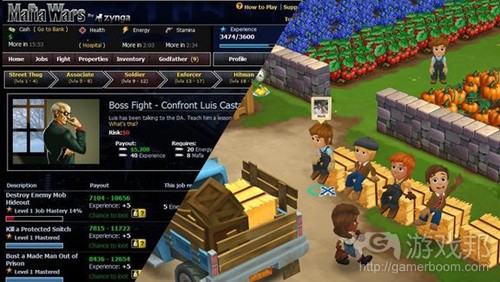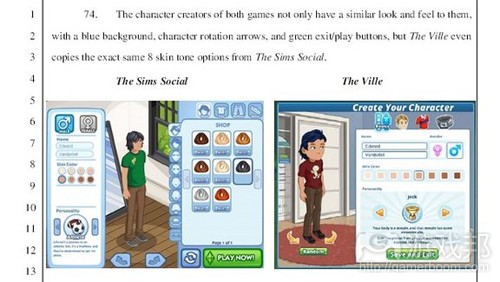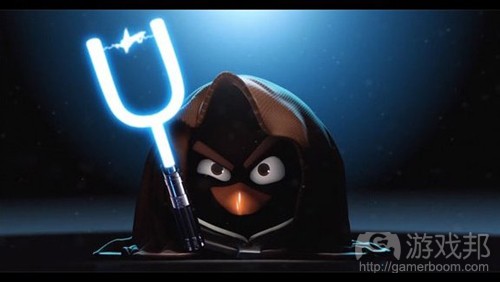关于社交游戏黄金时代已终结的8个理由
作者:Connor Sheridan
Facebook曾兴起一股游戏淘金热。Zynga等新兴公司从中成功掘金,EA等大型公司也迅速派遣自己的分队涉水这一市场。它们制作了许多叫座的游戏,似乎人人都在从这个非硬核领域中成功盈利。
但在Zynga上市之后,其股价连连下听跌之时,这个行业似乎一夜间陷入冰火两重天,现在的社交游戏热潮似乎已经降温,该领域开发商也出现多元化趋势。为何曾经风靡一时的社交游戏现在徒遭冷遇,为何这种现象会对我们和开发商更为有利?
1.Facebook限制病毒传播渠道
Facebook游戏曾经就像是《刺客信条》中索求无度的乞丐。只要用户一登录,就有数十款游戏聚集在其动态消息栏目中争相吸引用户的眼球。对游戏感兴趣的用户好友才应该是这些游戏的传播目标对象,而Facebook当时并没有提供让用户尝试新应用的中心枢纽。
但今年夏天,这一切发生了变化。Facebook推出了App Center并限制了应用的病毒传播性。App Center与iOS App Store大体相同,是专为Facebok多种娱乐活动而设计的一体化站点。它更为重视新应用,会优先推荐和展示这些新产品。并且用户好评在应用检索中的权重更大,营销或广告并不能凌驾于用户评价之上。
2)制作成本上升
对开发者来说,社交游戏的优越性还在于,其开发成本更低。这些游戏的主要吸引力在于与玩家的好友互动。它在技术上可能比其他游戏平台更有局限性,但这并不妨碍它成长为价值数十亿美元的市场。为了获得更多用户,这些游戏设计均奉行易用性原则(游戏邦注:即仅用鼠标或触控板就能操作),这也意味着它们不会有太多出色的动画效果或动作类型。
但如此之低的准入门槛,导致社交游戏市场很快就趋于饱和,其中竞争日益激烈。《Maifa Wars》设置了缓慢填充的进度条,《FarmVille》植入了丰富多彩的移动角色,甚至还推出了含有3D元素的《FarmVille 2》。大量相互竞争的产品迅速充斥这个原先尚待发掘的市场,希望从中脱颖而出的开发商不得不加快马力推出新作并投入大笔营销资金。毫无疑问,今天的社交游戏在质量水准上的确超过了原来的产品,但更高的成本则意味着这些游戏面临的风险更大并且更难以盈利。
3)模仿与剽窃现象
虽然“衍生设计”一直都是游戏制作的一个组成部分,但Facebook游戏还是因为将其上升到了新高度而招致恶名。EA和Zynga最近的《The Sims Social》vs 《The Ville》游戏侵权案还只是其中的冰山一角,虽然目前尚不知法官究竟会支持哪一方,但不少社交游戏在美术和机制上的普遍相似却已是不争的事实。
在此之前,社交游戏领域就已经缺乏创新的动力。希望这些不断涌现的法律纠纷问题可以为社交游戏开发商注入一针清醒剂。
4)盈利手段的问题
社交游戏开发商得收回成本,但采用预付费方式势必吓退热情的玩家。于是就诞生了微交易模式这个社交游戏命脉。采用小额付费方式是一个双赢策略:玩家可以免费试玩游戏,如果觉得好玩他们就会掏钱,如果不好玩,他们也不会有什么损失。
但许多游戏并不仅是通过盈利手段来限制玩家所体验的内容——它们甚至会惩罚那些不愿掏钱的玩家。有趣的游戏设计就像是一种教育 ,它会让玩家迅速进步并掌握游戏的核心概念。而多数“免费”游戏却像是骗子老师,它们的教材内容是“时间就是金钱”。这种游戏无关玩家的技能,在某些程情况下玩家甚至需要付费才能跳过一些无趣的场景,例如等待能量条/钱币重新填满。与此同时,免费增值模式也对硬核游戏市场产生了重大影响,《英雄联盟》等热作证明免费游戏也可以在不采用干扰性盈利手段的前提下,兼具盈利性和趣味性,而与之相似的社交游戏也在迎头赶上。
5.泡沫破灭
曾经有段时间,几乎每天都有某家公司CEO大谈社交游戏的发展潜力。例如EA和Digital Chocolate等知名公司就吸引了一群全新用户。而销量持续疲软的传统游戏开发商,也开始意识到只有采用类似Facebook游戏的策略才能让盗版产品无路可走。
但这个已经形成气候的市场规模仍然有限,并未拥有足够的“鲸鱼”用户(游戏邦注:即出手阔绰的高消费游戏玩家)以补偿持续上升的开发成本。拥有深度交互性,简单且含有病毒传播性的游戏似乎开始止足不前。风险投资者们开始为原先势不可挡但随后发展趋缓的初创公司而担忧,这一领域出现了大批投资者和员工的撤退潮。社交游戏泡沫开始破灭。
6.博彩游戏兴起
Facebook营收榜单前5名中有3款游戏属于博彩产品,这是有原因的:人们就是有好赌的天性。许多网络赌徒并不在乎自己到底从中赚了多少钱,这些游戏也并不允许将筹码兑换成现金。但在虚拟牌桌上赌博的乐趣一点也不亚于在赌场中玩牌。
美国政府至今未通过在线赌博合法化的法案,但Zynga却已先行一步聘请了该领域专家担任公司相关业务高管。该公司计划向允许在线赌博的海外市场进军,并且我们也敢打赌这绝非唯一涉足博彩领域的社交游戏公司。
7.提升设计水准
社交游戏可能是唯一让运营模式与游戏机制并重的游戏类型。虽然我们在此所说的大多数游戏主要设计目的是为开发商盈利,但它们同时也是出自铁杆玩家(即希望更多玩家接触游戏的开发者)之手的产品。但许多热门社交游戏的设计宗旨,很大程度上是为了最大化活跃用户的盈利性。
Zynga首席执行官及创始人Mark Pincus通过各种必要方法确保公司盈利性与独立性,Zynga成了社交游戏行业成功盈利的模板。即使这类游戏已经不再赤裸祼地压榨用户的金钱(但仍然盈利可观),并且提供了更为出色的高质量游戏体验,社交游戏依旧难以洗脱过去的污名。
8.移动平台崛起
智能手机确实是游戏开发者的一个正确赌注:Strategy Analytics市场调研发现2012年第三季度全球有10亿以上智能手机投入使用,同比上年增长47%。人们现在正逐渐远离桌面电话,随时随地就能掏出新潮的手机体验各种娱乐活动,但Facebook游戏并没有及时搭上这辆顺风车。
Zynga等社交游戏在此领域的表现最有说服力,《FarmVille 2》这款Zynga拳头产品至今未登陆iOS或Android平台,即使它进驻手机游戏市场,其游戏体验也很可能重蹈《CityVille Hometown》覆辙,并大打折扣。如果社交游戏公司不希望在这个市场落后,那么它们很有必要加紧跟上步伐了。
未来预期
社交游戏淘金热已经结束,但这个领域真会沦为空城吗?不可能。人们还是喜欢同好友玩游戏,所以绑定社交元素的游戏仍会很有市场。甚至是在最具硬核特点的游戏中也出现了这一倾向,例如《使命召唤》推出的游戏社区Call of Duty Elite以及《Sleeping Dogs》的Social Hub。但可以肯定的是,社交游戏不可能重返原来的高利润时期,以及让用户受挫的特性。也许人人都可以算是游戏玩家,我们只是想要更好玩的游戏。(本文为游戏邦/gamerboom.com编译,拒绝任何不保留版权的转载,如需转载请联系:游戏邦)
8 reasons social gaming’s gold rush is drying up
Connor Sheridan
Coming back to earth
Facebook was a gaming gold rush. New companies like Zynga struck it rich, and big guys like Electronic Arts quickly dispatched their own prospecting business units to get in on the action.
Games were made, claims were jumped, and everyone seemed to be making money from gamers well outside the hardcore fold.
The overnight industry got a serious reality check after Zynga went public, and its stock price fell almost as quickly as its executive roster. Now social’s growth is leveling off, and its developers are diversifying. What seemed to be the Next Big Thing in video games is just another way to play games. Why’d the gravy train ever have to slow down, and why’s that likely good for us and developers?
1. Facebook injected a viral app vaccine
Games on Facebook used to be like beggars in Assassin’s Creed. As soon as users logged on, ten games would claw at their newsfeeds, jostling for position and begging for attention.
Automatic updates from infected, err, interested friends were the primary way for the games to spread, since Facebook didn’t have much of a central repository for trying new apps.
All that changed this summer, when Facebook introduced the App Center and clamped down on how talkative apps could be. The App Center, much like the iOS App Store, is an all-in-one destination for Facebook’s various diversions. It even prioritizes recent apps over established ones, giving new games a chance at the spotlight. Novelty, good ratings from users (and yes, whoever is highest grossing) started to matter more for discovery than who could shout the loudest on the most news feeds. (Editor’s Note: Shouting is easier than making a good game.)
2. Expectations are higher
Social games were a breeze to get into for developers because they were inexpensive to make. Much of their appeal lies in interacting with a player’s pre-assembled list of friends. It may have more technical constraints than other gaming platforms, but a billion-strong market is attractive enough to overlook any flaws. To tap as many of those users as possible, the games were designed to be playable on just about anything with a mouse or trackpad–and that meant no fancy animations or demanding action segments.
But with such a low barrier to entry for creation, the social gaming market soon became crowded with contenders. Mafia Wars had slowly filling progress bars, so FarmVille anted up with colorful moving characters. FarmVille 2 even has–gasp–polygons! Competition grew for what was once an underserved market, and standing out meant spending more and working faster. There’s no doubt the social games of today are worlds better than their predecessors, but more expense always means more risk and harder-earned profits.
3. Plagiarism is rampant
Cannibalism isn’t just for the Donner party and remote tribes in Papua New Guinea. While “derivative design” has always been a part of the craft of games, Facebook titles earned a reputation for taking it to new depths. Electronic Arts and Zynga are just two of several parties currently locked in a mudslinging legal battle over the latter hewing a few pixels too close to The Sims Social with competitor The Ville. While the ruling could go either way, the wholesale Xerox-ing of aesthetics and mechanics is sadly common in the social space.
Before, there was little incentive to be original in social games, but no reason not to do as Zynga founder Mark Pincus puts it, “copy what they do and do it until you get their numbers.”
Hopefully the visibility of the no-holds barred legal battle will convince social game makers otherwise.
4. Mo’ monetization gave players mo’ problems
Social game creators had to make back their money somehow, but upfront expenses might turn away otherwise eager players. That’s where microtransactions–social gaming’s lifeblood–came in.
Smaller purchases throughout the life of a game can be a win-win: Players try it for free and if they like it, they put money into it, and if not, they don’t lose a cent in finding out.
But many of the games didn’t just limit content–they outright penalized those who refused to shell out. Fun game design is like an education, with players progressing as quickly as they can master the concepts. Most “free” social games were teachers on the take, and their textbook was the time value of money. It doesn’t matter how well players do; at some point, they’ll need to pay up or suffer through intentionally not-fun scenarios like waiting for an energy meter to refill or coins to pile up. Meanwhile, the free-to-play business model hit core gaming like an earthquake. Some free-to-play titles like League of Legends proved they could be fun and profitable without aggravating, intrusive, and discouraging methods, and now its social cousins are playing catch up.
5. The bubble bobbled
For a while there, it was tough to go a day without hearing another CEO talk up social gaming’s mindboggling potential. Established companies like Electronic Arts and Digital Chocolate whiffed a whole new audience. Developers, discouraged by slipping sales, realized that there’s no pirating a game that’s only valuable when it integrates with all our Facebook buddies.
But the established market just wasn’t big enough to support all those heavy hitters. There weren’t enough “whales” (a term used to refer to high-waging gamblers–or high-spending virtual farmers) to cover rising expenses. Simple, viral-minded games with the depth and meaningful interactions of a subway jostle somehow stopped being enough. Venture capitalists began to sweat at slowing growth from former sky-is-the-limit start-ups. Investors and employees jumped ship. The bubble burst.
6. People just want to wager
There’s a reason that three of Facebook’s five top-grossing apps (Zynga Poker, DoubleDown Casino, and Slotomania) are casino games: Folks want to gamble. Many online high rollers clearly don’t care if they actually make money, since there’s no cashing out the chips. But it’s about as fun to bust at a virtual blackjack table as it is to bust at a casino’s, so we may as well not leave the house.
Online gambling is still considered illegal by the US government, but Zynga went ahead and hired an expert in the field for an executive position. The company plans to push into international markets where it’s permitted, and we bet our sweet patooties it won’t be the only social giant to get aboard that money train. Why worry about all these weird farm metaphors when you can just let people play virtual video poker for a little bit of real cash?
7. Social’s in a culture shift
Social games may be the only kind of game founded as much on business model as they are on mechanics. While most of the titles we talk about on GamesRadar are made for the profit of large businesses, they’re also made by gamers who want other gamers to enjoy them. It was difficult to say that about many popular social games, which were largely designed to monetize active users to a whole new degree.
Mark Pincus, Zynga’s CEO and founder, made sure his company was financially secure and independent at the outset by using any means necessary, even if that meant funneling users into scams.
Zynga’s success was a model for the industry’s rush on social games. Even if the genre has moved on to more upfront means of squeezing dollars out of players (losing survey scams but keeping good old cash shops) and offers some high-quality experiences not to be found anywhere else, the stigma of that roguish mindset will be tough to shake.
8. The growth is on mobile
Smartphones are the smart bet for game creators: Market research group Strategy Analytics found that more than 1 billion of the devices were in use worldwide in the third quarter of 2012, a 47 percent boom year-over-year. People are eager to leave laptops behind and load up their stylish new handhelds with diversions they can play anywhere, and that’s taken some serious wind out of Facebook gaming’s sails.
Unfortunately, you wouldn’t have known it by looking at social companies like Zynga, which somehow neglected to put its flagship title FarmVille 2 on iOS or Android. Even when it does, there’s a good chance it will be a lesser experience divorced from users’ hard-earned farms, as is the case in CityVille Hometown. If social gaming companies want to keep up with their market, they’d better hurry it up.
Expectations managed
The gold rush is over, but will social games turn into ghost towns? Not likely. People enjoy playing with their friends, so games that have baked-in social elements will always be welcome. Their influence is felt in even the most core titles, like the community stat-tracking bonanzas of Call of Duty Elite or Sleeping Dogs’ Social Hub. But it’s a good bet that social games as we knew them before will never again be as extravagantly huge, and as flagrantly anti-consumer. Maybe now that everybody’s been a gamer for a bit, we all just want better games.
What do you think? Are social games changing for the better now that the climate’s calmed down, or will they always be a racket? Let us know in the comments–if you need us, we’ll be figuring out the conversion rate for FarmVille Farm Bucks to Angry Birds Super Seeds.(source:gamesradar)












































 闽公网安备35020302001549号
闽公网安备35020302001549号